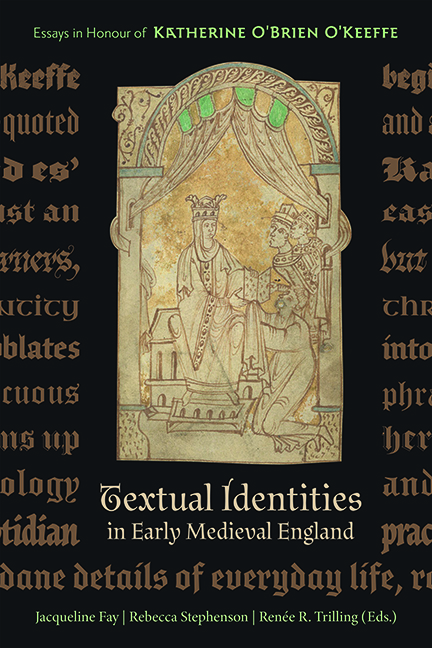Book contents
- Frontmatter
- Contents
- List of Illustrations
- List of Contributors
- Acknowledgments
- List of Abbreviations
- Introduction
- Part One Affect and Embodied Cognition in Medieval Didactic Texts
- Part Two Sovereignty, Power, and English Textual Identities
- Part Three Acts of Public Record in Making and Sustaining Communities
- Overview Of Career
- The Writings of Katherine O’Brien O’Keeffe
- Bibliography
- Index of Manuscripts
- General Index
- Tabula Gratulatoria
- Anglo-Saxon Studies
2 - Wonders Never Cease in the Old English Boethius
Published online by Cambridge University Press: 26 May 2022
- Frontmatter
- Contents
- List of Illustrations
- List of Contributors
- Acknowledgments
- List of Abbreviations
- Introduction
- Part One Affect and Embodied Cognition in Medieval Didactic Texts
- Part Two Sovereignty, Power, and English Textual Identities
- Part Three Acts of Public Record in Making and Sustaining Communities
- Overview Of Career
- The Writings of Katherine O’Brien O’Keeffe
- Bibliography
- Index of Manuscripts
- General Index
- Tabula Gratulatoria
- Anglo-Saxon Studies
Summary
‘[Þ]a se wisdom þa ðis lioð asungen hæfde, þa hæfde he me gebundenne mid þære wynsumnesse his sanges þæt ic his wæs swiðe wafiende and swiðe lustbære to geheranne mid innewearde mode.’
AFTER ONE of the meters in the Old English Boethius, the narrator expresses his wonder at Wisdom's teaching, neither for the first nor the last time. Wonder had already drawn me to Old English before I first met Katherine O’Brien O’Keeffe, but she helped to cultivate and focus my sense of wonder. As a teacher and mentor, Katherine asks probing and unexpected questions – which is both thrilling and terrifying. I still recall my excitement as I developed my dissertation idea and talked it through with her, and to this day, I feel a sense of wonder towards my dissertation's central text, the Boethius, and so I revisit it here.
Even those who haven't been Katherine's students can feel the wonder in her work beginning with the questions she asks in her research: how do manuscripts show interactions between practices of orality and writing? How did the monks of the English Benedictine Reform understand agency and freedom? Why are tongues so dangerous and in need of discipline? Wonder leads us to investigate and to learn, and Katherine has modeled this process for many of us.
We know how it feels, but what is wonder? Wonder is a cognitive emotion: it combines intellection and feeling. Caroline Walker Bynum’s 1997 American Historical Association Presidential Address on ‘Wonder’ treats the High Middle Ages, but her description works well for the earlier English Middle Ages too. For Bynum, wonder is ‘cognitive, non-appropriative, perspectival, and particular. Not merely a physiological response, wonder was a recognition of the singularity and significance of the thing encountered.’ She also notes that the term embraces a range of responses perhaps broader than today, ‘from terror and disgust to solemn astonishment and playful delight’. Bynum demonstrates that later medieval writers contrasted wonder with imitation: we wonder at what we cannot do ourselves. She adds, ‘you could wonder only where you knew that you failed to understand. Thus, wonder entailed a passionate desire for the scientia it lacked; it was a stimulus and incentive to investigation.’
- Type
- Chapter
- Information
- Textual Identities in Early Medieval EnglandEssays in Honour of Katherine O'Brien O'Keeffe, pp. 34 - 53Publisher: Boydell & BrewerPrint publication year: 2022
- 2
- Cited by



